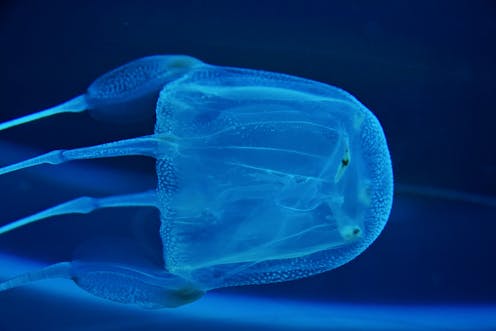How to treat jellyfish stings (hint: urine not recommended)
- Written by Richard McGee, Senior lecturer in Paediatrics, University of Newcastle

If you have been stung by a jellyfish at the beach, you’ll know how painful and unpleasant it can be. But how best to treat jellyfish stings has been debated over the years.
Is it best to use hot water or an ice pack? How about pouring on vinegar or rubbing with sand? Then there’s the popular myth about urinating on your leg, which health professionals have debunked[1] many times[2] but seems to resurface regardless.
We looked at the evidence for popular treatments and have just published[3] our analysis in a Cochrane review. This is what we found.
Read more: When we swim in the ocean, we enter another animal's home. Here's how to keep us all safe[4]
Why do jellyfish stings hurt so much?
Jellyfish are common in coastal regions around the world.
They have tentacles covered with tiny stinging cells called nematocysts. When these cells touch your skin, they release venom that can cause burning, redness, swelling and sometimes more serious reactions, such as heart issues.
Fortunately, most jellyfish stings are not life-threatening. Symptoms differ depending on the species. And the best treatment for one species is not always the best for another.
By knowing which treatment works and which doesn’t, you can reduce your discomfort and avoid complications.
Read more: Want to avoid a bluebottle sting? Here's how to predict which beach they'll land on[6]
What we did
We found nine trials involving treatments for two types of jellyfish:
bluebottles or Portuguese man o’ war (Physalia)
box jellyfish (Cubozoa), which are considered the most dangerous jellyfish. Some box jellyfish can cause Irukandji syndrome (a condition that may lead to severe pain, heart problems, and very occasionally death).
These trials, involving 574 people, tested various treatments such as vinegar, hot water, ice packs, isopropyl alcohol, methylated spirits, ammonia and sodium bicarbonate.
The trials also looked at Adolph’s meat tenderiser (a powder thought to break down proteins) and Sting Aid (an over-the-counter treatment thought to help ease pain after a variety of stings).
Read more: Welcome to Australia, a land of creatures out to kill you... maybe[7]
So what works?
Regardless of the jellyfish species, it’s reasonable to first remove any visible tentacles with tweezers or a gloved hand. What to do next depends on the species.
For bluebottles, try heat
The data in our included studies provides what’s described as low-certainty evidence for soaking the affected area in water about 45℃ to ease the pain. This is thought to denature the venom protein. At the beach, you could apply a heat pack or take a hot shower.
There was not enough evidence to show whether other treatments, such as ice packs, were effective for bluebottle stings.
For box jellyfish, try vinegar
For box jellyfish stings, the evidence was more limited. Our review did not find sufficient evidence to support current[9] recommendations[10] to apply vinegar to inactivate the nematocysts.
Nevertheless, it’s reasonable to try vinegar. That’s because evidence[11] not considered as part of our review shows vinegar inactivates nematocysts when tested in the laboratory.
When to seek medical care
Most symptoms can be managed at the beach or at home. But always seek medical attention if you or the person you’re looking after has symptoms such as:
difficulty breathing
chest pain
nausea
vomiting
weakness, or
drowsiness.
Such severe symptoms mean monitoring and treatment in hospital may be needed. If the person stops breathing or has a heart attack, they need immediate basic life support.
Read more: In cases of cardiac arrest, time is everything. Community responders can save lives[12]
What not to do
Do not rub or scrape the area with sand or a towel because this might cause more nematocysts to release their venom.
When it comes to treatments, our review found some may be harmful or ineffective, so should be avoided.
These included ammonia, methylated spirits and fresh water, as they may cause burns on the skin or trigger more venom to be released from nematocysts.
Avoid pressure immobilisation bandaging (wrapping a bandage tightly around the limb) as this may also trigger more venom release from nematocysts.
We found vinegar, sodium bicarbonate, Sting Aid or meat tenderiser have no proven benefit and may cause irritation or infection.
Perhaps not surprisingly, there were no published trials looking at the effectiveness of urine as a treatment and so it’s not recommended.
Prevention is best
Remember, prevention is better than cure. Keep an eye on safety announcements from lifeguards, monitor the water for jellyfish and wear protective clothing to prevent stings where possible.
References
- ^ debunked (www.scientificamerican.com)
- ^ many times (health.clevelandclinic.org)
- ^ just published (www.cochranelibrary.com)
- ^ When we swim in the ocean, we enter another animal's home. Here's how to keep us all safe (theconversation.com)
- ^ Shutterstock (www.shutterstock.com)
- ^ Want to avoid a bluebottle sting? Here's how to predict which beach they'll land on (theconversation.com)
- ^ Welcome to Australia, a land of creatures out to kill you... maybe (theconversation.com)
- ^ Shutterstock (www.shutterstock.com)
- ^ current (resus.org.au)
- ^ recommendations (www.ilsf.org)
- ^ evidence (onlinelibrary.wiley.com)
- ^ In cases of cardiac arrest, time is everything. Community responders can save lives (theconversation.com)
Read more https://theconversation.com/how-to-treat-jellyfish-stings-hint-urine-not-recommended-202844

















